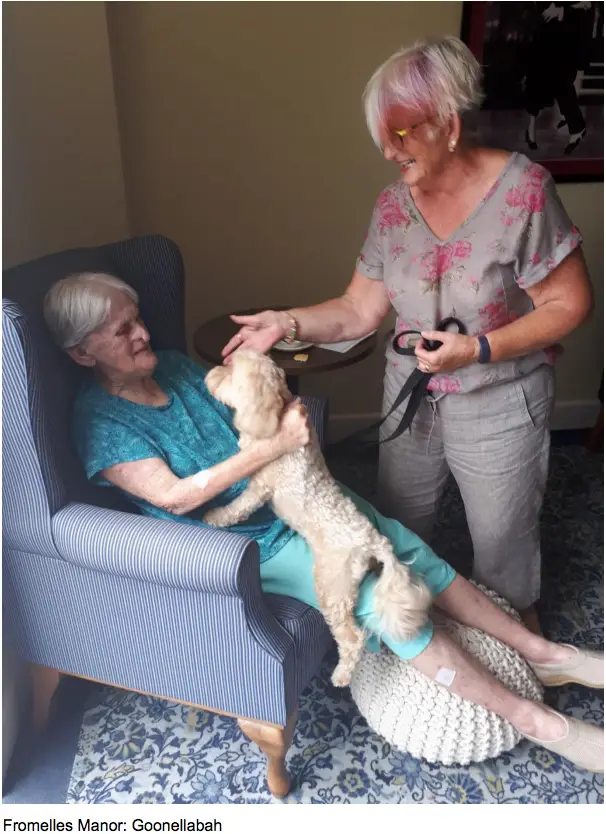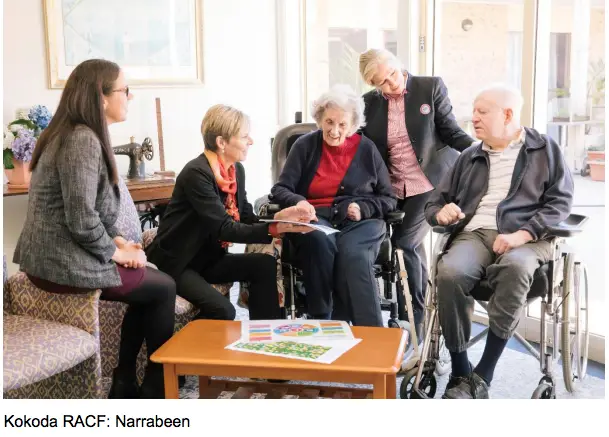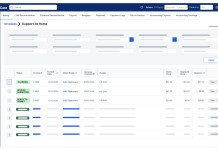This article is part of our showcase of the 2019 Future of Ageing Awards. RSL Lifecare was highly commended in the Consumer Experience category.
RSL LifeCare launched an exciting new project called ‘All Interactions Matter’ (AIM). The project saw the creation of a new service delivery model.
Project Overview
The AIM project focused on introducing ‘Relationship Centred Care’, changing from a rotating roster to a ‘consistently assigned’ roster has enabled the development of stronger relationships between customers, carers and families.
It also looked at ‘Dining Experience’ by providing more choices mainly through increased culinary options, flexible mealtimes, and addressing acoustic issues to create a calm and inviting dining environment, as well as ‘Leisure and Lifestyle’ by recognising individual preferences in lifestyle choices and providing a variety of connections to the wider community.
After the very successful completion of a pilot program in two Residential Aged Care Facilities (RACF) in October and December 2018, AIM is now being rolled out across all of the organisation’s residential aged care facilities.
How it came together
The AIM project was born out of the need for our organisation to align with the changing regulatory landscape. The need for a new and innovative service delivery model for RSL LifeCare had already been identified.
For this model to succeed it needed to meet the choices and preferences of seniors, deliver great customer outcomes, and provide increased job satisfaction for employees. RSL LifeCare started by developing a deeper understanding of how our customers and employees were feeling.
They knew there were key areas we needed to address, and with the new standards looming it was a perfect opportunity to ‘get the ball rolling’. They began by looking at how we could provide a better service and greater choice for our customers, move away from the existing traditional model of care, more suitable in the hospital setting, and try to provide a safer and more ‘homely’ environment for customers, remain competitive in an expanding industry sector, and reate one RSL LifeCare model of care for all Residential Aged Care Facilities.
To address these four key areas, a collaborative process was adopted to collect customer and employee feedback through a customer-focused 40 question best practice survey tool covering all aspects of daily living, care and environment. The survey measured the degree to which the customers were engaged and indicated their preferences.
RSL LifeCare also ran an online survey for its employees.
Using the customer data, they developed a series of heat maps to highlight people’s preferences and the level to which they were engaged. The data was collated (on multiple levels – individual, community and enterprise) to create a model that was based on customers’ requests and needs.
While there was a lot of positive feedback, RSL LifeCare identified three areas requiring improvement. These areas have become the foundation of the project.
RSL LifeCare selected two pilot sites to trial the AIM project. With the changing regulatory landscape looming, they wanted to meet the requirements of the new Aged Care Quality Standards (July 1 2019), better serve the needs of customers and improve employee satisfaction.
$1m was invested in the pilot. A project group of one project manager and two change implementation managers was created. This group spent three months at each of the pilot sites conducting surveys and carrying out research on customers and employees. The data was collated and analysed using heat maps.
Workshops with residents and staff helped the RSL LifeCare team create and customise the AIM model. These workshops enabled them to collect data pertaining to customers and employees. They wanted to build a model that was customised for RSL LifeCare, and not simply a vanilla model reflecting what other aged care providers were doing.
Additionally, the facilities that had implemented AIM, and had been assessed by the Aged Care Quality and Safety Commission, had received positive results.

Based on these early positive results, the AIM project will roll out across all Residential Aged Care Facilities (RACF), existing sites and new sites. Each roll out with take at least three months.
To assist in the roll out an additional investment of $1m has been made this financial year, and two additional change implementation managers have been hired to ensure the implementation process can be achieved in under 18 months.
Each facility staff member attends intensive workshop training, built by the project team. The change implementation manager stays in the facility for two weeks after the implementation. Ongoing support is provided remotely for anyone requiring extra support.
Progress at each facility is monitored and a report is submitted on a monthly basis. As new employees start, they are required to complete mandatory online training prior to the commencement of employment, followed by mandatory on-site workshop training.
Outcomes
Current outcomes from the AIM project include increased reported satisfaction levels for customers and their families, significant improvements in clinical outcomes and reductions in employee sick leave and turnover.










